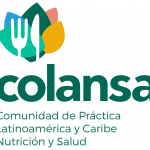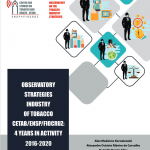
Organizations in Latin America and the Caribbean launch a community focused on improving public policies on health and food systems
COLANSA (Latin American and Caribbean Nutrition and Health Community of Practice), organized by IDEC (Brazilian Institute for Consumer Defense), IECS (Institute of Clinical and Sanitary Effectiveness), INTA (Institute of Nutrition and Food Technology of the University of Chile ), INSP (National Institute of Public Health), IAHF (InterAmerican Heart Foundation) and CLAS (Healthy America Coalition) will produce information to support public policy actions focused on food systems and the prevention of chronic non-communicable diseases. The presentation will be on March 10, 2021 at 2:00 p.m. (Brazilian time) in a live broadcast on YouTube and Twitter.
On March 10th, a network of national and international organizations will present an innovative community that will act in Latin America and the Caribbean, COLANSA. The online event will be broadcast through COLANSA’s Twitter (@ColansaLac) and on IDEC’s YouTube channel from 2pm (BRT) / 11am (MEX) / 12pm (EST).
Mediated by journalist Kennia Velásquez, a member of the Mexican Network of Science Journalists, the event will be attended by Fabio Gomes, regional advisor on nutrition and physical activity for PAHO (Pan American Health Organization); Roberto Bazzani, Senior Program Specialist at the regional office of IDRC (International Development Research Center); Camila Corvalán, researcher at INTA, and Ana Paula Bortoletto, nutritionist and technical consultant for IDEC’s Healthy and Sustainable Eating Program.
COLANSA is an unprecedented community formed by researchers and civil and academic society organizations from Latin American and Caribbean countries that aims to help develop healthy, sustainable, equitable and inclusive food systems, and thereby improve the diet and health of the region.
The group will analyze and study all the processes involved in food – from the way food is produced, the type of advertising, national regulations, to supply and consumption – with the aim of producing scientific knowledge and evidence for support the creation of public policies that help the healthy and sustainable development of the region.
For the Executive Director of the InterAmerican Heart Foundation (IAHF), Eugenia Ramos, COLANSA will connect research and advocacy staff and promote the application of public policies that benefit nutritional environments and people’s health. “Sharing what has worked, how it has been done and under what circumstances, as well as what has not, and why, is essential for the region. It also makes it easier for a problem to be tackled by people who have a common goal but who may have different experiences and knowledge to contribute ”, commented the director of the IAHF.
According to Dr. Ramos, COLANSA will have the ability to analyze the factors that affect the food environments of Latin American and Caribbean countries, such as economic, cultural, gender, and others such as the impact of advertising and promotion. “In addition, it will generate training and exchange instances and will centralize in a single online platform a collection with scientific information, public policies, advocacy and other documents of its own and other regional databases,” she says.
Until now, entities and individuals from Brazil, Argentina, Bolivia, Chile, Colombia, Costa Rica, Ecuador, El Salvador, Guatemala, Mexico and Uruguay have already joined the collaborative network. Although there are already networks of professionals working on specific issues related to health and nutrition, the exceptionality of COLANSA lies in the fact that it is the first wide-ranging community – more than 20 countries and more than 580 million inhabitants – that discusses and produces information and evidence on all the processes that are part of healthy food systems.
Ultra-processed foods, the great challenge
The countries of the region show many similarities in their eating patterns. Although everyone still prioritizes healthy foods, there has been an exponential growth in the consumption of ultra-processed foods. “We know that a healthy diet prevents chronic diseases and that excess sugars, salt and fats have a negative impact. These critical elements must be very clearly visualized by consumers and that is why it is one of COLANSA’s main proposals: to promote the implementation of frontal nutritional labeling of warnings on groceries ”, says Dr. Ramos.
For the director of the IAHF, labeling is a tool for informing the public and introducing positive changes in food environments. “It seeks not only to inform and warn the general public about what they are consuming, but that they are not sold or offered in schools, hospitals, public services and other agencies where state purchases are involved, in addition to not being advertised to children, girls and adolescents. But it is a great challenge because the food industry in many cases has opposed frontal food labeling or has actively worked to weaken this measure, ”she says.
“It is necessary to recognize the link between healthy eating, quality of life and the impact of non-communicable diseases on the economic development of countries. At the same time, governments and decision makers must recognize the progressive deterioration in the quality of the food consumed by their population ”, says the director of the IAHF.
Learn more about COLANSA
COLANSA seeks to play a leadership role in Latin America and the Caribbean, creating a space for discussion and debate and a democratic environment for the contribution of ideas and solutions that improve the food systems of the region and, in this way, help to prevent chronic non-communicable diseases, such as diabetes, hypertension, and even some types of cancer.
Its performance is produced through collaborative learning, contributing to innovation and the development of links between member countries, so that there is an exchange of knowledge and tools to solve problems with multidisciplinary approaches. The members of COLANSA do not have any type of link with the food and beverage industry, so that there is no conflict of interest at any time and so that their actions are free, transparent and focused on welfare and public health.


